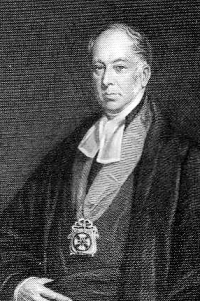Richard Whately
|
The Most Reverend Richard Whateley |
|
|---|---|
| Archbishop of Dublin and Bishop of Glendalough |
|
 |
|
| Diocese | Dublin and Glendalough |
| Installed | 1831 |
| Term ended | 1863 |
| Predecessor | William Magee |
| Successor | Richard Chenevix Trench |
| Personal details | |
| Born |
1 February 1787 Cavendish Square, London |
| Died | 8 October 1863 (aged 76) |
| Nationality | English |
| Denomination | Church of Ireland |
| Alma mater | Oriel College, Oxford |
Richard Whately (1 February 1787 – 8 October 1863) was an English rhetorician, logician, economist, academic and theologian who also served as a reforming Church of Ireland Archbishop of Dublin. He was a leading Broad Churchman, a prolific and combative author over a wide range of topics, a flamboyant character, and one of the first reviewers to recognise the talents of Jane Austen.
He was born in London, the son of the Rev. Dr. Joseph Whately (1730–1797). He was educated at a private school near Bristol, and at Oriel College, Oxford from 1805. He obtained a B.A. in 1808, with double second-class honours, and the prize for the English essay in 1810; in 1811 he was elected Fellow of Oriel, and in 1814 took holy orders. After graduation he acted as a private tutor, in particular to Nassau William Senior who became a close friend, and to Samuel Hinds.
After his marriage in 1821, Whately lived in Oxford. He had had to give up his college fellowship, which could not be held by married men, and at this period lived by tutoring and his pen. An uncle, William Plumer, presented him with a living, Halesworth in Suffolk; in August 1822 Whately moved there. In 1825, he was appointed principal of St. Alban Hall, a position obtained for him by his mentor Edward Copleston, who wanted to raise the notoriously low academic standards at the Hall, which was also a target for expansion by Oriel. Whately returned to Oxford, though giving up only in 1831 the Suffolk living, where he had seen the social effects of unemployment.
A reformer, Whately was initially on friendly terms with John Henry Newman. They fell out over Robert Peel's candidacy for the Oxford University seat in Parliament. Newman later spoke of his Catholic University as continuing in Dublin the struggle against Whately which he had begun at Oxford.
...
Wikipedia
